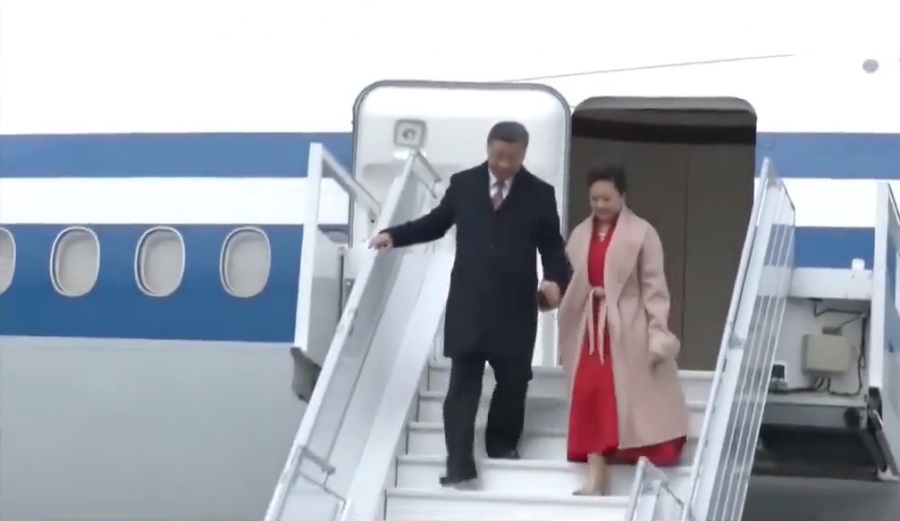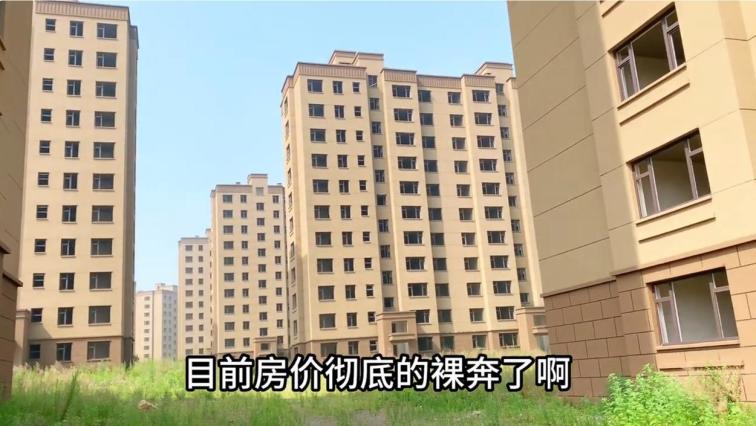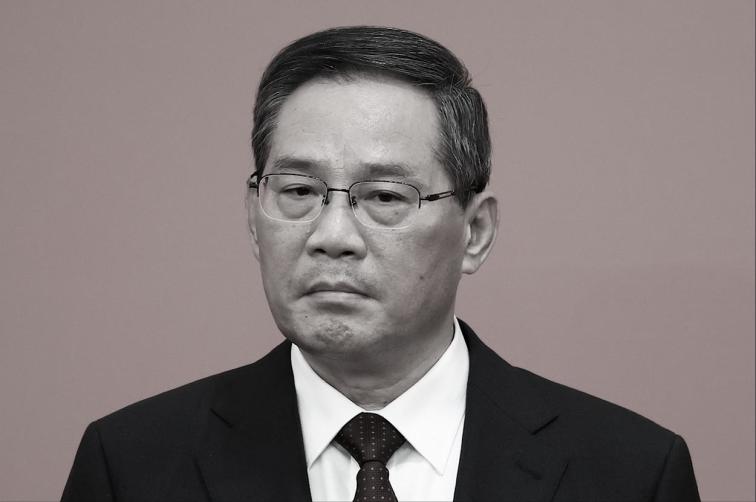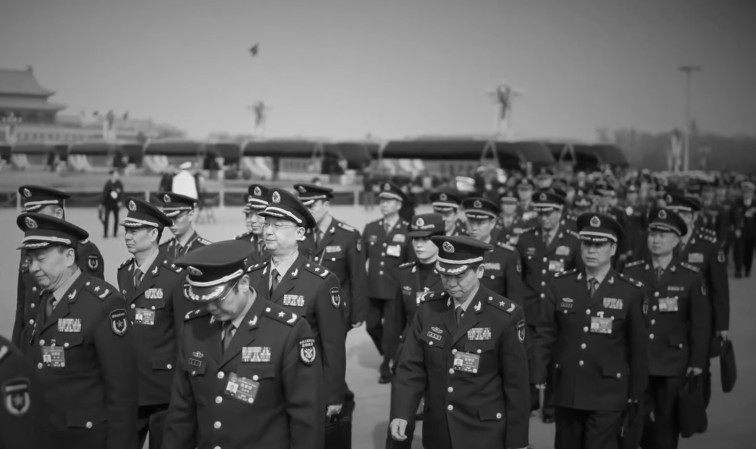Xi Jinping appeared to walk with difficulty during his visit to France. (Video screenshot)
[People News] Public curiosity about Xi Jinping’s daughter, Xi Mingze, has long focused on her appearance, her marriage, and other private matters. But in 2025, the nature of this attention has changed—Xi Mingze is quietly stepping onto the political stage.
1. Covering for Her Father
On June 4, 2025, Belarusian President Alexander Lukashenko met with Xi Jinping in Beijing.
According to a June 9 report by Belarusian state media, Xi’s wife, Peng Liyuan and daughter Xi Mingze attended the banquet Xi hosted for Lukashenko. Belarus’s First Deputy Prime Minister Nikolai Snopkov, speaking on Belarusian television, revealed that both women were present at the dinner.
Snopkov specifically quoted something Xi said in a private part of the meeting: "My friend, you and I share a special relationship, so today we are having a family dinner. Historically, this will be the first time my daughter is dining in this way with a foreign leader."
This non-public political debut of Xi Mingze has reignited outside speculation. Is this a deliberate move by Xi to position her as his successor?
Lukashenko’s visit came shortly after former U.S. President Donald Trump bombed Iranian nuclear facilities, suggesting Lukashenko was sounding out Beijing's stance. On the world stage, Russia, China, North Korea, and Iran are seen as part of the so-called “Axis of Evil”. Belarus, closely aligned with Russia and used as a missile deployment base, seemed to be reporting to its "big brother" in China in light of America’s aggressive actions against Iran.
Lukashenko’s political manoeuvres often reflect deeper strategies—and so might Xi’s.
For instance, according to a June 21 dispatch from Minsk via Belarusian state media, Lukashenko met with Keith Kellogg, the U.S. special envoy on the Ukraine issue. Their delegations met jointly.
Lukashenko remarked, "Your visit has stirred up a lot of international reaction. But I’m surprised—can’t Belarus and the United States have a normal dialogue and discuss our bilateral relations?"
Just as observers speculated that Belarus might be pivoting toward the U.S., Chinese state outlet Xinhua reported on August 1 that after meeting Lukashenko on Valaam Island, Putin announced that Russia’s latest “Zircon” hypersonic medium-range ballistic missiles had been produced and delivered to the military. Deployment sites in Belarus had already been selected, confirming that Belarus remains a loyal Russian ally.
Looking back, hasn’t Xi Jinping always played both sides—the U.S. and Russia? On one hand, he sends envoys to negotiate with Washington, giving the appearance of cooperation. On the other, he covertly deepens ties with Moscow, fueling the Russia-Ukraine war. This two-faced “Tai Chi” approach is very characteristic of the CCP.
But if both sides one day realise Xi’s duplicity, how will he pull off a strategic retreat? How can he avoid Belarus thinking China has betrayed Russia—while simultaneously convincing the West that Beijing is not entangled with Putin? This is where Xi Mingze may play a key role.
2. Selling Offices on Her Father's Behalf?
From April 14–18, 2025, Xi Jinping visited Vietnam, Malaysia, and Cambodia. During this trip, a piece of news caused a major stir. Xi Mingze reportedly visited Chinese consulate staff and Chinese enterprises, during which she made an unexpected remark: "My father is not power-hungry, and he’s not seeking lifetime rule. My mother and I have always urged him to step aside for the sake of his health."
Initially, this was dismissed as hearsay. Chinese blogger “A Ruthless Person” jokingly asked: "Is she helping her father sell official positions?" In hindsight, that may have been prophetic. Since May 20, Xi Jinping has frequently disappeared from public view. At the Beidaihe retreat and July’s Politburo Standing Committee meeting, he has shown signs of gradually ceding power.
But why reveal this message now? And why in Southeast Asia?
Political commentators believe the most likely reason is Xi’s health. Media figures Chen Pokong and Taiwanese professor Ming Juzheng have pointed out that every time Xi disappears for half a month, it looks like he is undergoing a medical treatment cycle. When he reappears, he often handles state affairs in a concentrated burst—a pattern that now serves as a key indicator of his physical condition.
More intriguingly, Southeast Asia is the most densely populated region with CCP intelligence networks and the fastest information flow outside China. Journalist Zhou Mingfeng, aka “Master Zhou,” revealed that: "Southeast Asia is crawling with Chinese agents from the military, Ministry of State Security, Ministry of Public Security, Foreign Affairs, and more." These factions don’t report to each other, and high-level CCP information often leaks from here first.
Thus, Xi Mingze’s “leak” in Southeast Asia is likely a deliberate tactic—a way to transmit messages quickly to China’s political elite, especially those eyeing top positions. It also lays the groundwork for a future power transition, implying that those hoping to succeed must show loyalty and offer favours.
Media figure Jiang Wangzheng revealed in a program: “Gift money from Zhejiang is shockingly high.” Zhou Mingfeng added, “The telecom fraud parks in Southeast Asia are controlled by China’s Ministry of State Security. Formerly disgraced official Ye Hanbing was one of their ringleaders.” These fraud zones are purely about extracting money—and they have a lot of it. Two self-proclaimed state security officials, She Zhijiang and Guo Huaping, were caught with 2.1 billion yuan and 7 billion yuan in illicit funds, respectively.
3. A Sudden Turn of Events
From “The Prophecies of the Back-Pushing Diagram” (Tui Bei Tu), Symbol 46:
A soldier carries a bow,
Claims to be the white-haired elder.
In the eastern gate lies a hidden golden sword,
A warrior enters the imperial palace from the rear.
“A soldier carries a bow”—some analysts believe this refers to Zhang Youxia. Others interpret “carrying a bow” as referring to Li Qiang or the late Li Keqiang, both political adversaries of Xi.
Yet another theory suggests the archer symbolises Xi Jinping himself. According to traditional Chinese astrology, human traits are influenced by the 28 lunar mansions. The eastern group includes seven mansions, among them Wei (Tail), shaped like a bow, forming the tail of the Azure Dragon. As Commander-in-Chief, Xi is also a military figure. The “archer” could represent his personality: stern, calculating, combative. It is this combative nature that may ultimately be his undoing.
No matter how carefully choreographed Xi Mingze’s political debut may be, it won’t change the CCP’s brutal internal power struggles. Xi still faces three major pressures: Domestic economic collapse. Factional infighting within the Party. Diplomatic isolation on the world stage. Some commentators speculate that Xi hopes to install his daughter as his successor. But the big question remains: Can she carry her father's political burdens? △











News magazine bootstrap themes!
I like this themes, fast loading and look profesional
Thank you Carlos!
You're welcome!
Please support me with give positive rating!
Yes Sure!